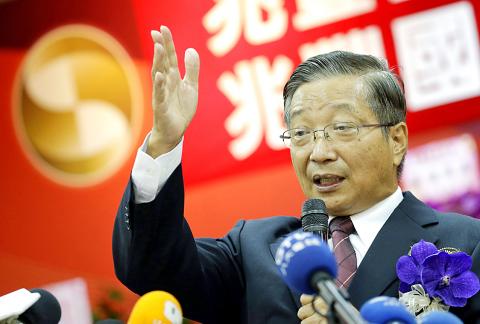Newly appointed Mega Financial Holding Co (兆豐金控) chairman Michael Chang (張兆順) yesterday said that his first task would be to address the public criticism that has beset the state-run company since it ran into regulatory problems in the US.
Last month, Mega International Commercial Bank (兆豐銀行), the flagship bank of Mega Financial was fined US$180 million by the New York State Department of Financial Services (DFS) for breaching rules against money laundering.
The incident stemmed from a compliance failure, Chang said, adding that the bank was not involved in money laundering activities.

Photo: EPA
“There are stark discrepancies between the views of the public and the management team that must be addressed,” Chang said during a handover ceremony in Taipei.
The company would look into what happened and produce an explanation that the public would find satisfactory, and also remedy the firm’s shortcomings on internal oversight measures, Chang said.
He said that the heavy regulatory penalty resulted from the company’s inaction between March last year — when the DFS notified the bank it was looking into its activities — and Aug. 19, when it issued the fine against Mega Bank.
“US regulators do not have a zero-tolerance policy regarding compliance failures, and 95 percent of cases have not resulted in punitive fines,” Chang said.
Mega Financial would try to explain why the company had forgone the opportunity to communicate and appease US regulators, he said.
The company would release its findings to the public within the confines of Article 48 of the Banking Act (銀行法), which stipulates that banks must preserve confidentiality of client information, barring orders by judicial bodies or instances involving significant delinquent debt write-offs involving sums greater than NT$50 million (US$1.58 million).
Regarding allegations that Mega Bank laundered money on behalf of the Chinese Nationalist Party (KMT), Chang said that he has not yet familiarized himself with ongoing investigations.
He also said that he would look into allegations of questionable loans made by state-run Mega Bank to the KMT, a reference to Democratic Progressive Party (DPP) caucus whip Wu Ping-jui’s (吳秉叡) claim that the bank had lent US$50 million to KMT-run Central Investment Co (中央投資公司).
“I am here to solve problems so that the company can move past its current difficulties,” Chang said, adding that his appointment was not politically motivated, and that he would remain neutral even if fallout from the scandal extends to the KMT’s ill-gotten party assets.
“Without a solid foundation of regulatory compliance and internal controls, the bank would be building profits on quicksand,” Chang said.
On Thursday, Taiwan Ratings Corp (中華信評) said changes in the management of Mega Financial would not impact its operating capacity immediately, adding that the company has enjoyed stable operations for many years, and its business would not go astray simply because of a change in the board of directors.
Shares in Mega Financial gained 0.71 percent to close at NT$21.4 yesterday, rising for the first time following four consecutive sessions of declines.

To many, Tatu City on the outskirts of Nairobi looks like a success. The first city entirely built by a private company to be operational in east Africa, with about 25,000 people living and working there, it accounts for about two-thirds of all foreign investment in Kenya. Its low-tax status has attracted more than 100 businesses including Heineken, coffee brand Dormans, and the biggest call-center and cold-chain transport firms in the region. However, to some local politicians, Tatu City has looked more like a target for extortion. A parade of governors have demanded land worth millions of dollars in exchange

Hong Kong authorities ramped up sales of the local dollar as the greenback’s slide threatened the foreign-exchange peg. The Hong Kong Monetary Authority (HKMA) sold a record HK$60.5 billion (US$7.8 billion) of the city’s currency, according to an alert sent on its Bloomberg page yesterday in Asia, after it tested the upper end of its trading band. That added to the HK$56.1 billion of sales versus the greenback since Friday. The rapid intervention signals efforts from the city’s authorities to limit the local currency’s moves within its HK$7.75 to HK$7.85 per US dollar trading band. Heavy sales of the local dollar by

Taiwan Semiconductor Manufacturing Co’s (TSMC, 台積電) revenue jumped 48 percent last month, underscoring how electronics firms scrambled to acquire essential components before global tariffs took effect. The main chipmaker for Apple Inc and Nvidia Corp reported monthly sales of NT$349.6 billion (US$11.6 billion). That compares with the average analysts’ estimate for a 38 percent rise in second-quarter revenue. US President Donald Trump’s trade war is prompting economists to retool GDP forecasts worldwide, casting doubt over the outlook for everything from iPhone demand to computing and datacenter construction. However, TSMC — a barometer for global tech spending given its central role in the

An Indonesian animated movie is smashing regional box office records and could be set for wider success as it prepares to open beyond the Southeast Asian archipelago’s silver screens. Jumbo — a film based on the adventures of main character, Don, a large orphaned Indonesian boy facing bullying at school — last month became the highest-grossing Southeast Asian animated film, raking in more than US$8 million. Released at the end of March to coincide with the Eid holidays after the Islamic fasting month of Ramadan, the movie has hit 8 million ticket sales, the third-highest in Indonesian cinema history, Film